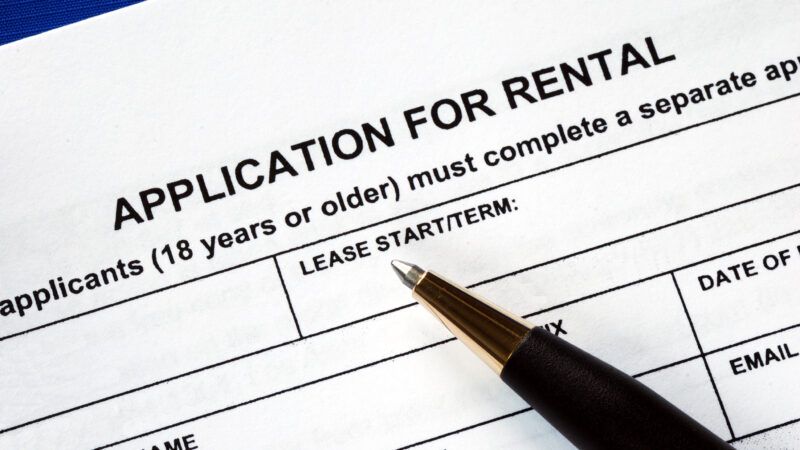ACLU-Backed Complaint Says Not Renting to People With Past Evictions Is Illegal Race, Sex Discrimination
HOPE Fair Housing Center argues in a new federal complaint that an Illinois landlord's blanket refusal to rent to people with eviction records amounts to illegal sex and race discrimination.

A taxpayer-funded fair housing nonprofit in Illinois, with the help of the American Civil Liberties Union (ACLU), is demanding a federal crackdown on landlords who don't rent to tenants with eviction records.
In a complaint filed with the U.S. Department of Housing and Urban Development (HUD) last week, the group HOPE Fair Housing Center argues that such policies amount to illegal discrimination based on race and sex, given the higher likelihood that black people, and particularly black women, will have an eviction record.
"A housing provider that enforces a policy that denies the opportunity to rent to anyone who has an eviction filing or judgment is disproportionately denying housing to Black households and Black women in particular," wrote HOPE Deputy Director Josefina Navar in a blog post published by the ACLU about the complaint.
Attorneys with the ACLU and the National Housing Law Project (NHLP) are assisting HOPE in their complaint.
HOPE's complaint targets the "no-evictions" policy of one specific landlord, Oak Park Apartments, which owns 90 multifamily buildings in the Chicago suburb of Oak Park, Illinois. Both the text of the complaint and the press materials argue this is a nationwide problem.
"Numerous studies, news reports, and advocate and tenant stories document just how typical a no-evictions policy is within the rental property owner community nationally," reads the complaint. "Often referred to as the 'Scarlet "E",' a history of eviction has effectively become a life sentence diminishing housing opportunities."
The federal Fair Housing Act bars housing providers from discriminating "because of" race and sex, along with other protected classifications like disability, national origin, and family status.
Subsequent court decisions and federal regulations established the idea that prohibition can apply to policies that had a "disparate impact" or "discriminatory effect" on protected classes—even if there's no discriminatory intent present.
HUD, for instance, has issued guidance saying that blanket policies that exclude tenants who have a criminal record can violate the Fair Housing Act. But critics argue that broad direction leaves housing providers with little guidance on the kinds of policies they can adopt to screen tenant or mortgage applicants.
"There's no way to really know that you're going to be facing potential liability down the road," says Ethan Blevins, an attorney with the Pacific Legal Foundation. "It does put landlords in a really tough position, and it's tough to know what a court will find legitimate."
In recent years, HOPE has participated in a number of lawsuits that expand the universe of housing industry practices that fall afoul of this disparate impact standard.
Last year, it sued an Illinois property management company over its policy of not renting to people with criminal records.
The group was also a co-plaintiff in a 2020 lawsuit alleging real estate listing company Redfin's policy of only listing homes above a minimum value had a discriminatory effect. Redfin settled that lawsuit for $4 million in 2022.
The Biden administration has provided generous support to private groups' efforts to police property owners' allegedly discriminatory housing practices, including HOPE.
In March, HUD announced it was awarding grants worth $54 million to 182 fair housing organizations as part of its "Fair Housing Initiatives Program."
HOPE received a three-year grant of $425,000 to fund its "private enforcement initiatives." The group says its HUD complaint is the first to challenge a landlord's no-eviction policy.
Even under existing fair housing regulations, housing providers can still adopt policies that have a disparate impact on protected classes, but they must show that these policies serve a "substantial, legitimate, nondiscriminatory interest" and that there's not another less discriminatory policy they could adopt to serve that interest.
One can imagine a pretty straightforward, race-neutral reason for not renting to people with eviction records: Someone who failed to pay the rent at their last apartment is more likely to fail to pay their rent at their next one too.
HOPE's complaint disputes this in Oak Park Apartments' case, in part, because the company doesn't distinguish between people who've actually been evicted and those who have merely had their landlord file for eviction.
The complaint suggests landlords could screen for problem tenants just as effectively with a policy that considers both the final result of eviction cases and the individual circumstances of each eviction and ignores old eviction cases.
Obviously engaging in those kinds of individualized investigations of each tenant places more burden on landlords. Blevins argues that landlords can afford to adopt broad policies like no-eviction requirements because housing supply is constrained by other regulations.
"Multifamily housing that's out there, it's a sellers' market. They can pick and choose whoever they want because there's a constriction on supply," says Blevins. "If you were to remove that constriction, all of a sudden there's a lot more competitive market. I think you'd see a lot of these policies go away."
More housing supply in general would also likely mean that fewer people would have eviction records to begin with. The lower rents born of more abundant supply would likely translate into fewer people having problems paying their rent and landlords more willing to work with those that do.
The fall in eviction rates during the pandemic—even in the absence of eviction moratoriums—is evidence that landlords are much less willing to pursue evictions when it's harder to get a replacement tenant.
With the complaint now filed, HUD will investigate Oak Park Apartments' no-eviction policy. HOPE could also file a private lawsuit challenging the policy.
Rent Free is a weekly newsletter from Christian Britschgi on urbanism and the fight for less regulation, more housing, more property rights, and more freedom in America's cities.


Show Comments (101)